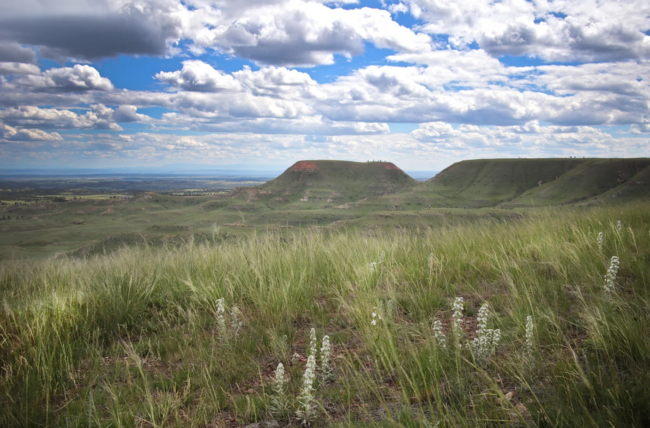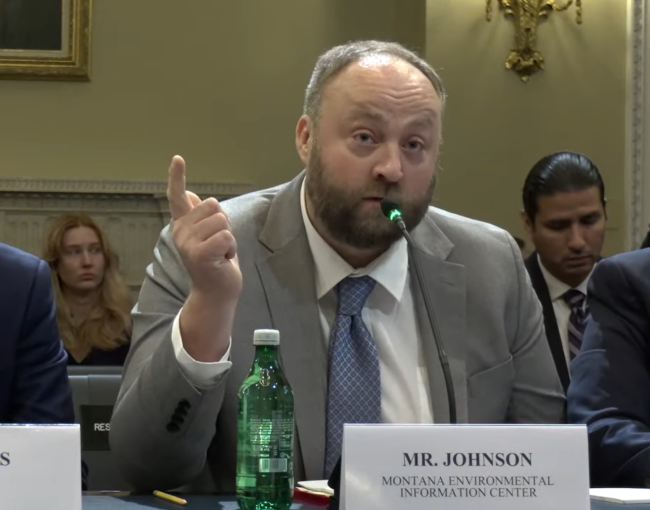by Anne Hedges

Bull Mountains photo via Earthjustice.
Once again, MEIC was forced to challenge a Montana Department of Environmental Quality (DEQ) decision that gives a free pass to a corrupt mining company. In August, DEQ approved another expansion of Signal Peak Energy’s underground coal mine in the Bull Mountains. Time and time again, DEQ approves coal mine expansions for this mine while ignoring the harm this mine is already causing to water resources for agriculture and wildlife, as well as the harm this mine poses to the climate when its coal is burned overseas.
Amendment 6 (AM6) was approved by DEQ in August. MEIC and our partners, represented by Earthjustice, challenged DEQ’s approval in late September. The newest mine permit allows the mine to extract 12 million tons of coal to allow it to continue operations while the federal Office of Surface Mining completes a long-overdue, court-ordered environmental impact statement on the mine’s current and potential harm to water resources, wildlife, agriculture, and the climate.
Instead of waiting for the federal Office of Surface Mining (OSM) to complete the more rigorous environmental analysis of the mine’s overall impact to water resources, wildlife, agricultural operations, and the climate, DEQ blazed ahead with approving another permit for the mine with little consideration for any of these issues. DEQ’s approval ignores all of the mines’ past environmental and economic harms, including that the company is on federal criminal probation for its corrupt actions at the mine. DEQ completely overlooked the existing and potential cumulative impacts to wildlife, water resources, and the climate. Instead of doing its job and holding Signal Peak accountable to the law, DEQ did the company’s bidding and approved another mine expansion with cursory analysis of the impacts or harm to people and wildlife in the area.
Daines Signal Peak Bill Gets Hearing in Congress
On November 19, MEIC’s Derf Johnson testified before the U.S. House of Representatives Natural Resources’ Subcommittee on Energy and Mineral Resources. At issue was Rep. Ryan Zinke’s bill to allow the evasion of a federal court order that required OSM to conduct a long-overdue analysis of the potential impacts of a massive expansion of Signal Peak’s Bull Mountains mine.
After years of litigation by MEIC, and our partners* against the federal government for doing an inadequate analysis of the mine’s profound environmental impacts, a federal court put a halt to the expansion until a meaningful analysis was completed. The federal court found that OSM had failed to consider the climate impacts of a mine expansion that is projected to add 375 million tons of greenhouse gases to the atmosphere. The court said, “…for each year of its operation, the coal from this project is expected to generate more GHG emissions than the single largest source of GHG emissions in the United States.” Despite this fact, OSM approved the expansion without considering the climate impacts, let alone the impacts that will continue to accrue to existing agriculture and wildlife from destruction of surface water resources.
Sen. Steve Daines then introduced three bills to allow the mine to bypass the court-ordered analysis. Rep. Ryan Zinke introduced a companion bill in the House that would allow the same evasion of the law. The misleadingly named “Crow Revenue Act” would provide no revenue to the Crow Tribe and would allow Signal Peak’s coal mine to continue mining without federal oversight or consideration of the harm to wildlife, agriculture, water resources, or the climate. Instead the House and Senate bills would give a private family all existing coal at the mine that is currently owned by the public, as well as nearly 1,000 acres of surface rights above the mine that currently allow critical access to public lands in the Bull Mountains. In exchange, the Crow Tribe would acquire some of the mineral interests held by the same family within the boundaries of its reservation — but the Crow would gain no surface rights. The coal on the Crow Reservation is extremely unlikely to ever be developed, as it is not near any existing mines or infrastructure. Sen. Daines’ and Rep. Zinke’s bills would require the Crow to share any revenue from the unlikely development of the newly acquired Crow coal with the private family. However, it would not require the private family to share coal revenues from its newly acquired Signal Peak minerals with the Crow.

MEIC Deputy Director Derf Johnson was one of five witnesses to give testimony and answer questions at the November 19 hearing before the U.S. House of Representatives Natural Resources’ Subcommittee on Energy and Mineral Resources. You can watch a recording of this hearing on the Committee website.
Derf Johnson testified against the House bill based upon MEIC’s and our partners’ concern for allowing this corrupt company to evade the law, destroy water resources, ignore agricultural producers and wildlife resources, and give away public lands, all without providing revenue to the Crow Tribe. This opposition to the bill is joined by over 100 organizations across the country who understand the harm that would result from adding 375 million tons of greenhouse gases into the air as well as giving public lands to private parties. The cross section of opposition to the bills is strong – hunters and anglers, agricultural producers, faith-based organizations, water advocates, and more. The bill is also opposed by the Apsáalooké Allottees Alliance, an Indigenous organization whose members reside on the Crow Reservation and who called the bill a “beautifully wrapped” but empty birthday present.
The bills will need to pass both houses or be attached to must-pass legislation in the lame duck session of Congress. MEIC will continue to work diligently to prevent their passage and the false hope they promise to a Tribe that deserves to be treated honestly and needs meaningful long-term solutions to its financial difficulties, not the empty promises from Sen. Daines and Rep. Zinke.
*MEIC, 350 Montana, Sierra Club, and WildEarth Guardians, represented by Earthjustice and the Western Environmental Law Center in our successful challenge to OSM’s approval of Signal Peak’s mine expansion.
This article was published in the December 2024 issue of Down To Earth.

